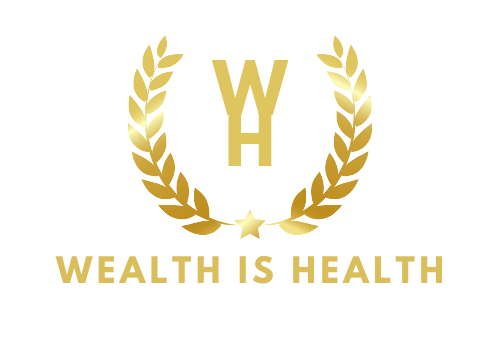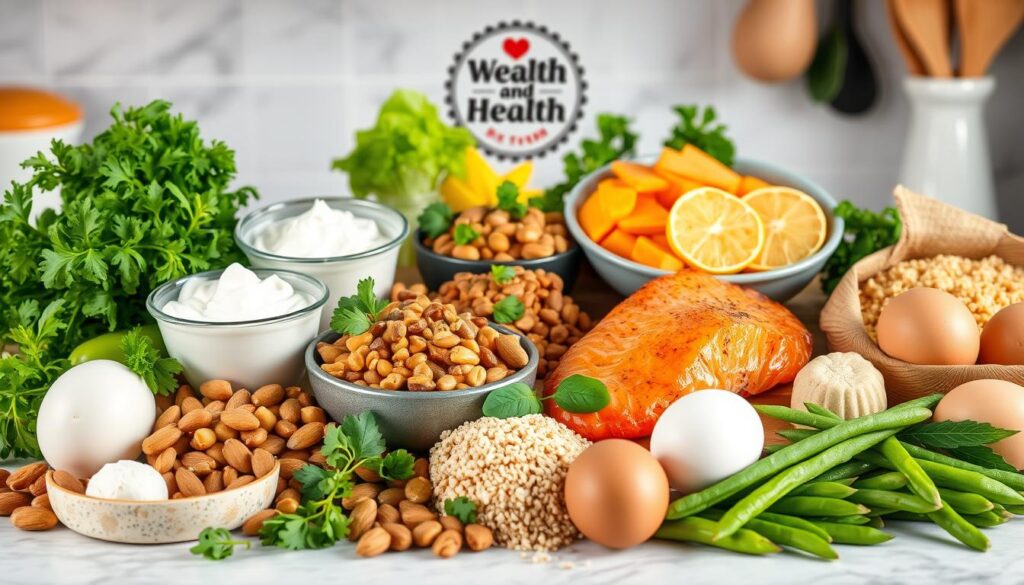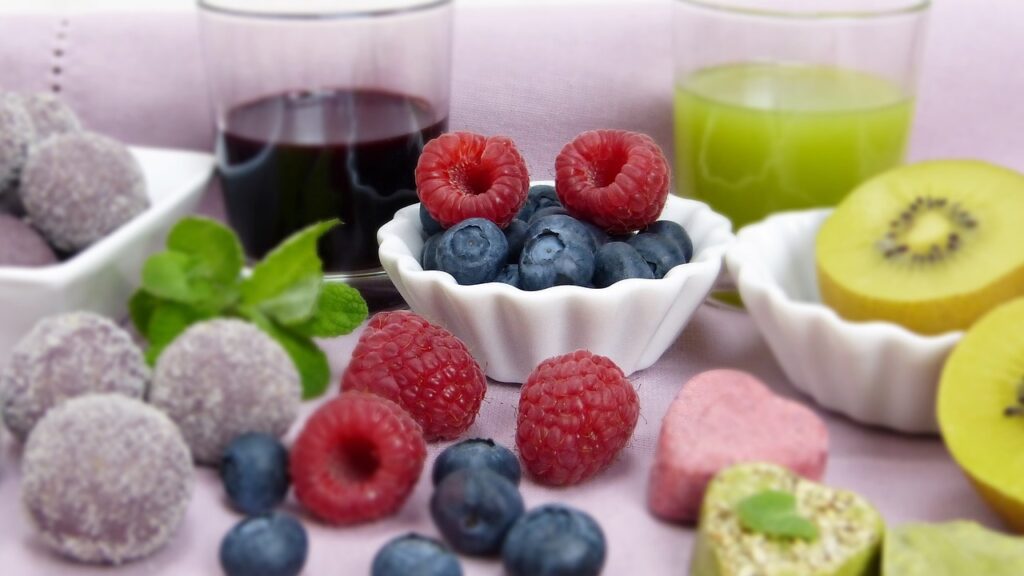In today’s fast world, have you thought about what keeps us going? The answer is protein. But how important are protein-rich foods for our health? Let’s find out the amazing benefits of adding these foods to our meals.
Key Takeaways
- Protein is a vital macronutrient that supports various bodily functions.
- Consuming a variety of protein-rich foods can provide essential amino acids and numerous health benefits.
- Recommended daily protein intake ranges from 10-35% of total caloric intake.
- Protein-rich foods include eggs, lean meats, seafood, dairy, legumes, and whole grains.
- Incorporating these protein-rich sources into your diet can help you feel full, support muscle growth, and maintain a healthy weight.
Introduction to Protein Rich Foods
Proteins are vital for our bodies, helping with health and well-being. They support muscle growth, repair tissues, and help with many body functions. Knowing the importance of protein and protein requirements is crucial. It helps ensure we get enough protein-rich food sources in our diet.
Importance of Protein for Overall Health
Protein is key for our cells, tissues, and organs. It builds and repairs muscles, supports the immune system, and helps make hormones and enzymes. Eating foods high in protein can also help with weight management by keeping you full longer.
Daily Protein Requirements
The daily protein need is 0.8 grams per kilogram of body weight for adults. For someone weighing 150 pounds (68 kilograms), that’s about 55 grams of protein daily. But, needs can change with age, activity level, and health. A dietitian can figure out your exact protein requirements.
| Body Weight | Protein Requirement (RDA) |
|---|---|
| 150 lbs (68 kg) | 55 grams per day |
| 200 lbs (91 kg) | 70 grams per day |
“Consuming adequate protein from a variety of sources is crucial for overall well-being.”
Eating a variety of protein-rich food sources is important for health. You can choose from animal proteins like eggs and lean meats, or plant-based options like lentils and quinoa. There are many tasty and healthy choices out there.
Eggs: A Nutrient-Dense Protein Source
Eggs are a true powerhouse when it comes to protein. One large egg (50 grams) packs an impressive 6.3 grams of high-quality, easily absorbed protein. But the benefits of eggs go far beyond just their protein content. These incredible protein-rich eggs are also loaded with a wide array of essential vitamins, minerals, healthy fats, and antioxidants.
Whole eggs are particularly nutritious, as the yolk contains many of the egg’s key nutrients. In fact, the yolk provides the majority of an egg’s vitamins and minerals, including vitamins A, D, E, and B12, as well as iron, zinc, and choline. The yolk also contains health-promoting carotenoids like lutein and zeaxanthin, which support eye health.
| Nutrient | Amount in 1 Large Egg |
|---|---|
| Protein | 6.3 grams |
| Vitamin A | 6% of the RDI |
| Vitamin D | 8% of the RDI |
| Vitamin B12 | 9% of the RDI |
| Choline | 27% of the RDI |
The exceptional egg nutrition profile makes them a fantastic addition to any healthy diet. Whether you enjoy them scrambled, poached, or in baked goods, eggs are a versatile and nutrient-dense protein source that can support overall health and well-being.
“Eggs are a nutritional powerhouse, packed with high-quality protein, vitamins, minerals, and healthy fats. They’re a versatile and affordable way to boost your nutrient intake.”
protein rich foods: Plant-Based Powerhouses
Plant-based protein sources are becoming more popular for health. They offer great nutrition, unlike meat and dairy. Lentils and quinoa are two top plant-based proteins to try.
Lentils: A Versatile Legume
Lentils are a top choice for vegetarians and vegans. A cooked cup of lentils has 18 grams of protein. They also have lots of fiber, vitamins, and minerals.
- Lentils are easy to use in many dishes, like soups and baked goods.
- They’re affordable, last a long time, and are simple to prepare.
- There are many colors of lentils, each with its own taste and cooking time.
Quinoa: A Complete Protein Grain
Quinoa is a great plant-based protein with all amino acids. A cooked cup of quinoa has 8 grams of protein. It’s also full of fiber and minerals.
- Quinoa cooks fast and is light and fluffy.
- It’s gluten-free and a good choice for those with dietary limits.
- There are different types of quinoa, each with unique flavors and nutrients.
Adding lentils and quinoa to your diet is healthy and tasty. They’re great for anyone looking to eat more plant-based.
“Lentils and quinoa are powerhouses when it comes to plant-based protein. They offer a wealth of nutrients beyond just protein, making them an excellent choice for anyone seeking to boost their overall health.”
Lean Meats: A Concentrated Protein Punch
Lean meats are a top pick for protein. They are full of essential amino acids and have little fat. This makes them great for a healthy diet.
Chicken Breast: Lean and Protein-Packed
Chicken breast is a favorite for protein. It’s mostly protein with very little fat. A 3-ounce serving of chicken breast has about 27 grams of protein.
It also has important vitamins and minerals like vitamin B6, selenium, and niacin. Eating lean meats like chicken breast helps with muscle growth and health.
| Protein-Rich Meat | Protein Content (per 3-ounce serving) | Calories (per 3-ounce serving) |
|---|---|---|
| Chicken Breast | 27 g | 139 cal |
| Salmon (wild) | 24 g | 200 cal |
| Lean Beef (sirloin) | 19 g | 177 cal |
| Turkey Breast | 27 g | 140 cal |
Lean meats like chicken breast have a great protein-to-calorie ratio. They are perfect for boosting protein intake without too many calories.
“Lean meats, such as chicken breast, are an excellent choice if you’re trying to increase your protein intake. Chicken breast consists mostly of protein, with very little fat and few calories.”
Seafood: Healthy Protein from the Ocean
Seafood, like fish and shellfish, is packed with protein. Fish is full of vitamins and minerals like iodine, selenium, and vitamin B12. Fatty fish, such as salmon and herring, are also rich in omega-3 fatty acids. These acids are great for your health.
A half salmon fillet (124 g) has about 30.5 g of protein. A cod fillet (180 g) has an impressive 41 g of protein. Shellfish like shrimp and clams are also very protein-dense. They are great for increasing your seafood protein.
| Seafood | Protein Content (per 100g) |
|---|---|
| Fresh Tuna | 30.7g |
| Octopus | 29.8g |
| Canned Anchovies | 28.9g |
| Trout | 26.6g |
| Lobster | 20.3g |
| Snapper | 26.3g |
| Tilapia | 26.2g |
| Grouper | 24.8g |
| Whitefish (Cod, Haddock) | 24.5g |
| Mackerel | 24.1g |
With so many protein-rich seafood options, it’s easy to add this essential nutrient to your diet. Enjoying the health benefits of seafood is simple and delicious.
Dairy Delights: Protein-Rich and Versatile
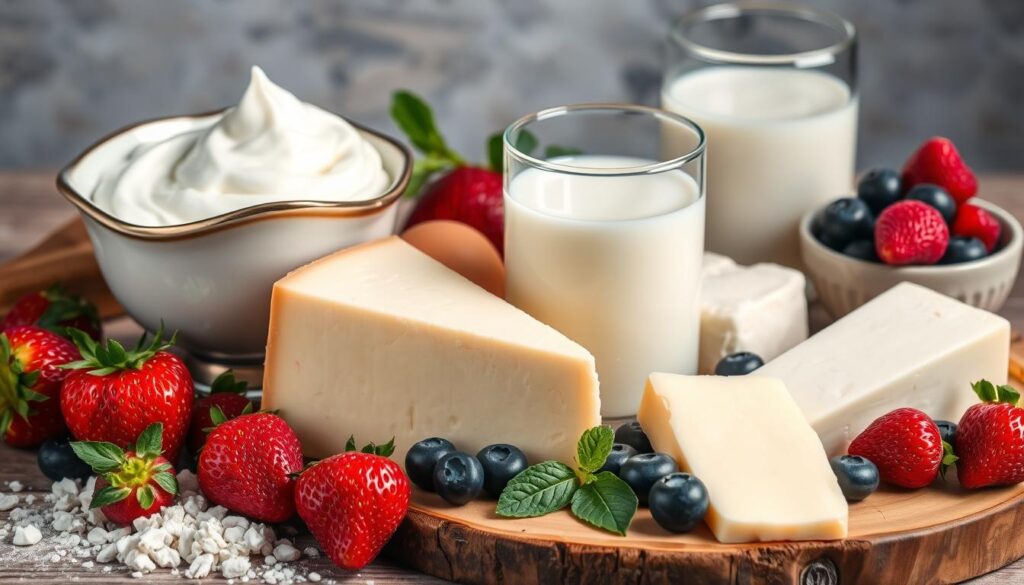
Dairy products are packed with protein. Greek yogurt and cottage cheese stand out for their high-quality protein.
Greek Yogurt: A Thick and Creamy Treat
Greek yogurt is strained to be thick and creamy. It’s a protein powerhouse. A 7-ounce container has 19.9 grams of protein.
It’s great for a snack or to add protein to smoothies and parfaits. You can also top fruit with it.
Cottage Cheese: A Protein-Packed Snack
Cottage cheese is low in fat and calories but high in protein. A 1-cup serving has 28 grams of protein.
Enjoy it alone, with fruit, or as a base for dips. It’s a tasty way to get your protein.
Other dairy options include cheddar and mozzarella. Cheddar has 3.96 grams of protein per slice. Mozzarella has 6.29 grams per ounce. Adding these dairy products to your diet supports health and wellness.
“Dairy products like Greek yogurt and cottage cheese are excellent sources of protein. They’re a versatile and nutritious addition to any diet.”
Nuts and Seeds: Portable Protein Powerhouses
Nuts and seeds are key for protein in your diet. They are easy to carry and full of nutrients. Almonds, in particular, are a great source of protein.
Almonds: A Nutty Source of Plant Protein
Almonds are tasty and full of good stuff. A small serving has 6 grams of plant-based protein. They also have fiber, vitamin E, and minerals like manganese and magnesium.
Other nuts and seeds with lots of protein are pistachios, cashews, pumpkin seeds, and sunflower seeds. Adding them to your meals can easily increase your plant-based protein.
“Nuts and seeds are portable, protein-rich snacks that can be easily incorporated into a variety of meals and recipes.”
You can eat them as a snack or add them to salads, yogurt, or oatmeal. They’re a great way to get more protein in your day.
Protein Powders: A Convenient Boost
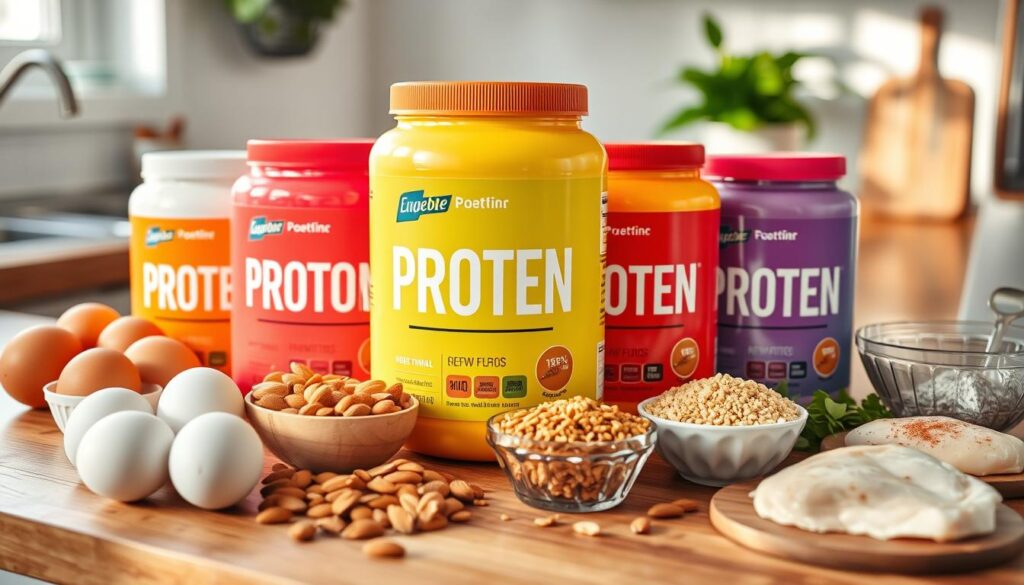
When you’re short on time, protein powders are a quick fix. They can be mixed into shakes, smoothies, and more. This makes it easy to get more protein. You can choose from whey protein or pea protein.
Whey protein comes from dairy and has about 16.6 grams of protein per scoop. Pea protein, a plant-based option, has 15 grams of protein per scoop. Both help you meet your daily protein needs, whether you’re active or just want to stay healthy.
| Protein Powder | Protein per Serving |
|---|---|
| Whey Protein | 16.6 grams (per 28.6-gram scoop) |
| Pea Protein | 15 grams (per 20-gram scoop) |
Studies show that whey protein can help you lose weight and body fat. It also boosts muscle size and strength in people who exercise regularly, no matter their gender.
But, always talk to a doctor before adding protein powders to your diet. If you already eat enough protein, too much can harm your kidneys, liver, and bones. Finding the right balance is key to enjoying the benefits of protein powders in a healthy diet.
Ezekiel Bread: A Wholesome Protein Source
Ezekiel bread is a standout in the world of healthy breads. It’s made from organic, sprouted whole grains and legumes. These include millet, barley, spelt, wheat, soybeans, and lentils. This bread is packed with protein, fiber, and essential vitamins and minerals.
One slice (50 g) of Ezekiel bread has 6 grams of protein. It’s a great choice for those looking for high-protein bread. The sprouting process boosts nutrient absorption, adding to its nutritional profile.
Ezekiel bread is low in sugar and sodium. It has 3 grams of fiber per slice. This makes it a great addition to a wholesome diet.
This bread is also organic, non-GMO, and vegan-friendly. It meets the needs of health-conscious eaters. There are many sprouted grain bread options, including low-sodium and gluten-free.
Ezekiel bread is perfect for supporting health, keeping blood sugar balanced, or just enjoying a tasty, nutritious bread. It’s a great choice for both taste and nutritional benefits.
Protein-Packed Sandwiches and Snacks
Protein-rich foods are key to feeling full and keeping energy up. There are many tasty options for sandwiches and snacks that are high in protein.
Peanut Butter: A Creamy and Protein-Rich Spread
Peanut butter is a great source of protein. A 2-tablespoon serving has about 7.2 grams of protein. It’s perfect for sandwiches, snacks, and smoothies.
Peanuts and peanut butter are not just high in protein. They also have folate, magnesium, and vitamin E. Adding peanut butter to your diet can easily increase your protein intake.
| Protein-Rich Food | Protein Content per Serving |
|---|---|
| Peanut Butter (2 tablespoons) | 7.2 grams |
| Beef Jerky (1 ounce) | 9 grams |
| Trail Mix (2 ounces) | 8 grams |
| Turkey Roll-Ups (1 wrap) | 12 grams |
| Greek Yogurt (200 grams) | 20 grams |
| Tuna (3 ounces) | 20 grams |
| Hard-Boiled Egg (1 egg) | 6 grams |
| Almonds (1 ounce) | 6 grams |
| Roasted Chickpeas (1/2 cup) | 7 grams |
| Cottage Cheese (1/2 cup) | 14 grams |
| Baked Tofu (3 ounces) | 9 grams |
Adding these protein-rich foods to your diet can make your sandwiches and snacks more satisfying. They will help keep you full and energized all day.
“Protein-packed snacks are essential for maintaining fullness and stabilizing blood sugar levels, as protein signals the release of appetite-suppressing hormones and slows digestion.”
Conclusion
Including a variety of protein-rich foods in your diet is key for good health. This article showed you many options like eggs, lean meats, seafood, and more. These foods give you the amino acids and nutrients your body needs.
Adding these protein sources to your meals and snacks helps you meet your daily protein needs. This leads to many health benefits. Make sure to also get other important nutrients for a balanced diet.
Want to build muscle, manage your weight, or stay healthy? Eating protein-rich foods is a great way to do it. Try out the tasty and healthy options from this article. See how protein-rich meals and snacks can change your life.
FAQ
What are some of the best sources of protein?
Great sources of protein include eggs, lean meats, and seafood. Dairy products, legumes, nuts, and seeds are also excellent.
Why is it important to get enough protein daily?
Protein is key for cell structure and immune function. It helps with muscle growth and overall health. Eating enough protein from various sources is vital for your health.
How much protein do I need per day?
The daily protein need is 0.36 grams per pound of body weight. This is the minimum to meet your body’s needs.
What are the benefits of eating protein-rich foods?
Protein-rich foods make you feel full and satisfied. They support muscle mass and help maintain a healthy weight. They also provide the building blocks for cells and support bodily functions.
What are some high-protein vegetarian and vegan options?
Great plant-based protein sources include lentils, quinoa, nuts, and seeds. Soy products like tofu and tempeh are also good options.
How can I easily incorporate more protein into my diet?
Add protein-rich foods like eggs, lean meats, seafood, and dairy to your meals. Legumes are also good. You can also use protein powders and nut butters to boost your protein intake.
